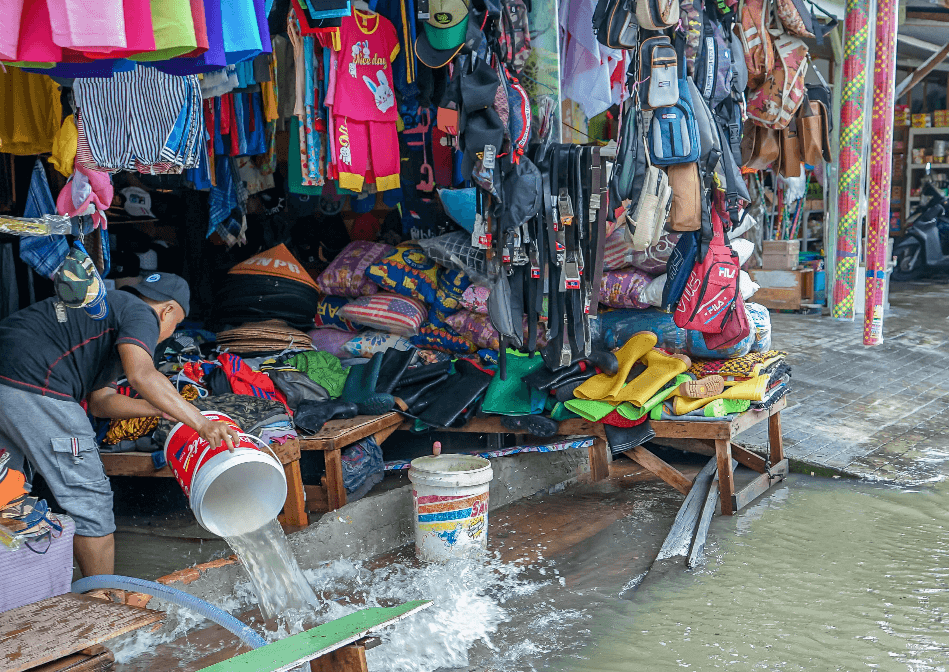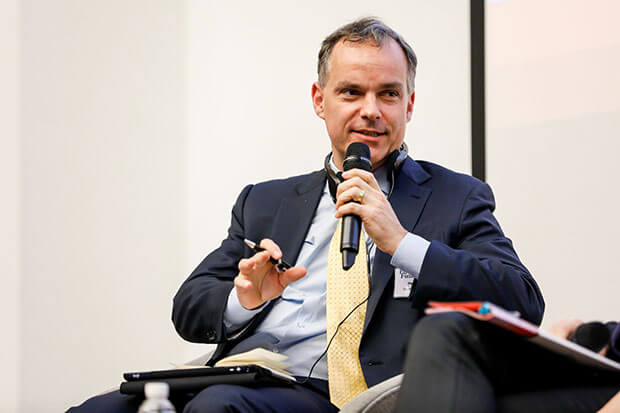
Climate events have surged in the past decade, and low-income people often feel the brunt of the impact. There are three primary reasons for this: their higher exposure to hazards, greater vulnerability to negative impacts from that exposure, and fewer resources to rebuild and recover losses quickly.
Unfortunately, people who are poor often face higher exposure to climate-related natural hazards because of who they are or where they live, which determines the quality of their homes and hugely impacts their overall health. They also tend to rely on agriculture as their primary source of income, creating a double hit of loss of assets and loss of labor productivity and income when a natural disaster strikes.
While we cannot prevent climate-related events from happening — and poverty itself increases vulnerability — financial inclusion is a tool that can help people experiencing poverty build resilience to climate shocks.
People often face higher exposure to climate-related natural hazards because of who they are or where they live, which determines the quality of their homes and hugely impacts their overall health.
Comparing Global Findex 2021 data on financial inclusion with data on climate vulnerability reveals that over 1 billion unbanked adults, more than 80 percent of the world’s unbanked population, reside in the most climate-vulnerable economies.
Financial resilience, defined by the Global Findex 2021 as the ability to access additional funds of up to 5 percent of GDP per capita within 30 days during emergencies, is also an issue related to financial account access. In climate-vulnerable economies, 58 percent of adults lack financial resilience, compared to 25 percent in less climate-vulnerable countries.
Lack of financial resilience is an issue even when controlling for GDP per capita—wealthier yet climate-vulnerable economies have a higher-than-average share of adults who lack resilience. Adults in climate-vulnerable countries are less likely to depend on social networks for emergency money since many members of the same family or community might lose jobs or income simultaneously, making it difficult to help friends or relatives.
Two Pathways Toward Resilience
Research has found a positive correlation between financial inclusion and financial resilience, indicating that increasing access to financial services can benefit people affected by climate change.
There are two primary opportunities to leverage financial inclusion for greater financial resilience:
1. Increase account ownership among unbanked adults in climate-vulnerable economies.
According to Global Findex data, adults with bank accounts are likely to make and receive digital payments, save money, access formal credit, and store their money securely. These services can help individuals invest in preventative infrastructure (e.g., better housing), diversify their income sources, and access savings and remittances to recover from disaster-related losses. The COVID-19 pandemic offers many examples of how governments were able to quickly and safely provide relief payments to individuals with bank accounts.
2. Encourage savings among individuals who already have bank accounts.
The Global Findex 2021 data consistently shows that individuals who rely on savings to manage financial emergencies are more likely to be financially resilient than those who rely on any other sources, such as friends and family, jobs, or selling personal assets. This finding holds true across all regions.
For some individuals, having a bank account can provide a secure location to store their money and increase their savings. However, incorporating design features that incentivize savings can provide an additional benefit that helps to boost savings balances and create a personally financed emergency fund, even before disaster strikes. These funds can be used for investments such as disaster-resistant housing and stress-resistant seeds or to diversify income streams. Individuals with readily available funds may also be more willing to migrate to less risky environments.
Individuals who rely on savings to manage financial emergencies are more likely to be financially resilient than those who rely on any other sources.
Increased access to credit through formal accounts could also benefit adults in climate-vulnerable economies, though only about 15 percent of adults in low- and middle-income countries use formal credit, on average.
While access to financial services cannot prevent climate-related events nor fully eliminate the factors that make poor adults more vulnerable to the negative impacts of climate change, it can enable them to better anticipate and respond to natural hazards. By coupling access to finance with programs that promote financial resilience, low-income individuals can reduce their exposure to the financial burdens of natural disasters.
The Office of the United Nations Secretary-General’s Special Advocate for Inclusive Finance for Development (UNSGSA), under the leadership of H.M. Queen Máxima of the Netherlands, recently convened a working group on inclusive green finance consisting of members from the Alliance for Financial Inclusion, the Center for Financial Inclusion, and the Sustainable Banking and Finance Network. The group produced a policy and advocacy note on inclusive green finance, along with an accompanying two-page summary report, which are available in the publications section at www.unsgsa.org and will be presented at the Responsible Finance Forum 2023 on July 5-7 in Bengaluru, India.












